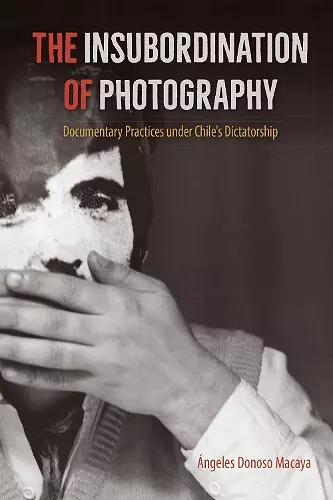The Insubordination of Photography
Documentary Practices under Chile's Dictatorship
Format:Paperback
Publisher:University Press of Florida
Published:30th Jan '23
Should be back in stock very soon

Latin American Studies Association Visual Culture Section Best Book Prize
Latin American Studies Association Historia Reciente y Memoria Section Best Book PrizeThe role of documentary photography in exposing and protesting the crimes of a dictatorship. After Augusto Pinochet rose to power in Chile in 1973, his government abducted, abused, and executed thousands of his political opponents. The Insubordination of Photography is the first book to analyze how various collectives, organizations, and independent media used photography to expose and protest the crimes of Pinochet’s authoritarian regime.
Ángeles Donoso Macaya discusses the ways human rights groups such as the Vicariate of Solidarity used portraits of missing persons in order to make forced disappearances visible. She also calls attention to forensic photographs that served as incriminating evidence of government killings in the landmark Lonquén case. Donoso Macaya argues that the field of documentary photography in Chile was challenged and shaped by the precariousness of the nation’s politics and economics and shows how photojournalists found creative ways to challenge limitations imposed on the freedom of the press.
In a culture saturated by disinformation and cover-ups and restricted by repression and censorship, photography became an essential tool to bring the truth to light. Featuring never-before-seen photographs and other archival material, this book reflects on the integral role of images in public memory and issues of reparation and justice.
A volume in the series Reframing Media, Technology, and Culture in Latin/o America, edited by Héctor Fernández L’Hoeste and Juan Carlos Rodríguez Publication of the paperback edition made possible by a Sustaining the Humanities through the American Rescue Plan grant from the National Endowment for the Humanities.
“Donoso Macaya offers an engaging, multidisciplinary, and well-researched analysis of Chile under the Pinochet dictatorship and in the process contributes to understanding the complexity and political implications of photography.”—Choice
“A necessary, timely, and original book. . . . Donoso Macaya skillfully and carefully has traced the ways photographs travel, incite public discussion, move from one setting to another, and transform.”—H-Net“Enriches the existing literature on the Chilean dictatorship by taking seriously the social and political power of photography. . . . Excellent and necessary.”—Latin Americanist“Through a series of emblematic case studies, the book makes a powerful argument about the multi-faceted visual and social impact of photography under repressive rule. . . . Its immense value lies in the way [Donoso Macaya] traces the social history of photographers who pushed the performative dimension of photography to challenge the dictatorship in various forms.”—Journal of Social History
“A valuable addition to the literature examining the social construction and performativity of images as well as the use of photography as a civil practice, areas that are essential to understanding the political uses and consequences of protest photography.”—The Americas“A very thoroughly researched and original contribution to studies of Chilean visual culture.”— Bulletin of Spanish Studies
ISBN: 9781683403548
Dimensions: 229mm x 152mm x 19mm
Weight: 216g
268 pages